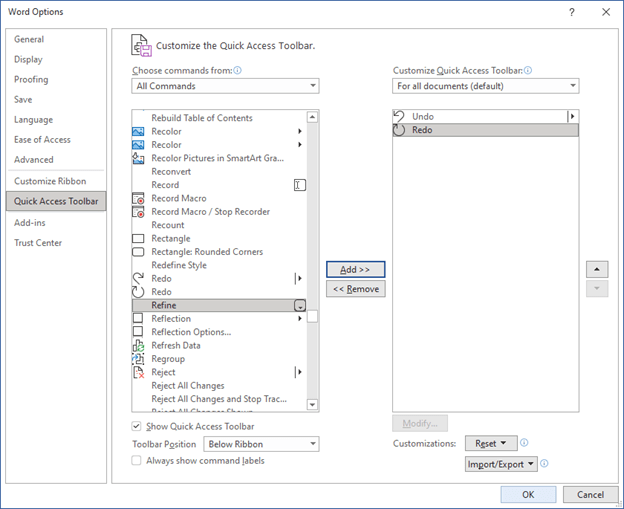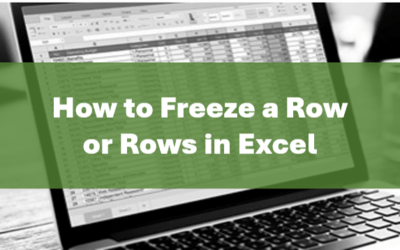Display the Quick Access Toolbar and Change Its Position
by Avantix Learning Team | Updated April 9, 2022
Applies to: Microsoft® Excel® 2021 and 365 (Windows)
In 2021 and 365 versions of Word, Excel and PowerPoint, you now have the ability to hide or unhide the Quick Access Toolbar. So if your Quick Access Toolbar seems to have disappeared, it may simply be hidden. In 2021, Microsoft also removed Undo and Redo / Repeat from the Quick Access Toolbar and moved these commands to the Home tab in the Ribbon.
There are a few ways to display the Quick Access Toolbar (QAT) and you can display it below the Ribbon.
The Quick Access Toolbar may not be hidden. In 2021 and 365 versions, it appears by default above the Ribbon simply as a down arrow if no other commands have been added to it. To make it easier to view and customize, simply click the down arrow and select Show Below the Ribbon to move it. You can then right-click commands in the Ribbon and select Add to Quick Access Toolbar. You may want to add Undo and Redo / Repeat since these commands have appeared in the Ribbon since 2007.
Recommended article: How to Insert Multiple Rows in Excel (4 Fast Ways with Shortcuts)
Do you want to learn more about Microsoft Word, Excel or PowerPoint? Check out our virtual classroom or in-person classroom courses >
Displaying the Quick Access Toolbar by right-clicking
To display the Quick Access Toolbar if it's hidden:
- Right-click in the Ribbon. A drop-down menu appears.
- Select Show Quick Access Toolbar.
The QAT may appear simply as a down arrow in the Title Bar.
Displaying the Quick Access Toolbar using Options
To display the Quick Access Toolbar using Options:
- Click the File tab in the Ribbon.
- Click Options at the bottom.
- Select Quick Access Toolbar on the left.
- Check or select Show Quick Access Toolbar.
- Choose the desired position of the Quick Access Toolbar from the Toolbar Position drop-down menu.
- Click OK.
Although you also have the option to Show Command Labels, they take up a lot of space.
Below is the Options dialog box in Word with Quick Access Toolbar selected in the categories on the left (which is similar in Excel and PowerPoint):
Hiding the Quick Access Toolbar by right-clicking
To hide the Quick Access Toolbar:
- Right-click in the Ribbon. A drop-down menu appears.
- Select Hide Quick Access Toolbar.
You can also click the down arrow in the Quick Access Toolbar (if it's displayed) and select Hide Quick Access Toolbar.
The Quick Access Toolbar is a great tool to customize your Microsoft applications and, in future, it may be hidden be default.
Subscribe to get more articles like this one
Did you find this article helpful? If you would like to receive new articles, join our email list.
More resources
How to Remove Duplicates in Excel (3 Easy Ways)
How to Merge Cells in Excel (4 Ways with Shortcuts)
How to Lock Cells in Excel (Protect Formulas and Data)
How to Combine Cells in Excel using Concatenate (3 Ways)
3 Excel Strikethrough Shortcuts to Cross Out Text or Values in Cells
Related courses
Microsoft Excel: Intermediate / Advanced
Microsoft Excel: Data Analysis with Functions, Dashboards and What-If Analysis Tools
Microsoft Excel: Introduction to Visual Basic for Applications (VBA)
Our instructor-led courses are delivered in virtual classroom format or at our downtown Toronto location at 18 King Street East, Suite 1400, Toronto, Ontario, Canada (some in-person classroom courses may also be delivered at an alternate downtown Toronto location). Contact us at info@avantixlearning.ca if you'd like to arrange custom instructor-led virtual classroom or onsite training on a date that's convenient for you.
Copyright 2024 Avantix® Learning
You may also like
How to Replace Zeros (0) with Blanks in Excel
There are several strategies to replace zero values (0) with blanks in Excel. If you want to replace zero values in cells with blanks, you can use the Replace command or write a formula to return blanks. However, if you simply want to display blanks instead of zeros, you have two formatting options – create a custom number format or a conditional format.
What is Power Query in Excel?
Power Query in Excel is a powerful data transformation tool that allows you to import data from many different sources and then extract, clean, and transform the data. You will then be able to load the data into Excel or Power BI and perform further data analysis. With Power Query (also known as Get & Transform), you can set up a query once and then refresh it when new data is added. Power Query can import and clean millions of rows of data.
How to Freeze Rows in Excel (One or Multiple Rows)
You can freeze one or more rows in an Excel worksheet using the Freeze Panes command. If you freeze rows containing headings, the headings will appear when you scroll down. You can freeze columns as well so when you scroll to the right columns will be frozen.
Microsoft, the Microsoft logo, Microsoft Office and related Microsoft applications and logos are registered trademarks of Microsoft Corporation in Canada, US and other countries. All other trademarks are the property of the registered owners.
Avantix Learning |18 King Street East, Suite 1400, Toronto, Ontario, Canada M5C 1C4 | Contact us at info@avantixlearning.ca









